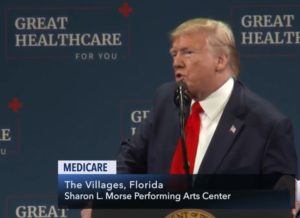After Repeal, Sabotage and The Texas Lawsuit, Trump Is Kidding Himself If He Thinks Americans Believe His Lies About Strengthening Medicare Or Offering “Great Healthcare”

Washington, DC — Today, President Trump held an event at The Villages in Florida, where he signed an executive order on Medicare as part of his campaign to cover his tracks while he wages a war to destroy the program and American health care generally. Brad Woodhouse, executive director of Protect Our Care, issued the following statement:
“President Trump is offering anything but ‘great healthcare.’ Actions speak louder than words: Trump’s budget cuts nearly a trillion dollars from Medicare, and his Texas lawsuit would reopen the Medicare ‘donut hole’ for seniors and jack up their prescription drug costs, all while he and his GOP allies refuse to end the ban on Medicare negotiating lower prices for prescription drugs. No amount of lip-service or false promises can undo the damage he’s already done, and will continue to do to Americans’ health care.”
BACKGROUND:
Donald Trump’s War On Medicare
President Trump signed an executive order that he says will “protect” Medicare, but the reality is his administration and their Republican allies in Congress have been on a relentless campaign to destroy it.
Here are some ways Trump has waged war on Medicare.
- President Trump and Republicans in Congress want to cut Medicare by hundreds of billions all to pay for their tax cuts for the wealthiest Americans. In 2017, President Trump signed a $1.5 trillion tax bill that disproportionately benefits the wealthy. Since then, Republicans have repeatedly tried to slash hundreds of billions of dollars from Medicare to pay for their tax breaks. The 2018 budget resolution passed by Republicans in December 2017 cut Medicare by $473 billion, the FY2019 budget passed by Republicans on the House Budget Committee cut Medicare by an additional $537 billion, and worst of all, the Trump administration released an FY2020 budget that would cut, $845 billion from Medicare, and repeal the Affordable Care Act.
- President Trump is trying to repeal the Affordable Care Act through the courts — a move which would raise drug costs for millions of people on Medicare. The Trump administration and Republican attorneys generals are arguing in federal court that the entire Affordable Care Act should be overturned. If they get their way, the Medicare “donut” hole would be immediately re-opened. From 2010 to 2016, “More than 11.8 million Medicare beneficiaries have received discounts over $26.8 billion on prescription drugs – an average of $2,272 per beneficiary,” according to a January 2017 Centers on Medicare and Medicaid Services report.
- As the cost of drugs skyrocket, President Trump and his Republican allies in Congress refuse to allow Medicare to negotiate for lower prescription drug prices. Under current law, the Secretary of the Department of Health and Human Services (HHS) is explicitly prohibited from negotiating directly with drug manufacturers on behalf of Medicare Part D enrollees. Although it would decrease both federal spending and beneficiaries’ out-of-pocket costs for prescription drugs, Republicans in Congress have remained staunchly opposed to negotiation. Despite his numerous campaign promises, a policy allowing the federal government to negotiate drug prices for Medicare beneficiaries was noticeably absent from President Trump’s prescription drug plan, and the administration has remained silent about whether it supports the House Democrats’ plan to allow negotiation and lower drug costs.
- Trump and Congressional Republicans repealed several components of the ACA designed to help keep Medicare’s costs down, effectively driving up costs for the program. By repealing the requirement that most people have insurance as part of the Trump tax bill, Congressional Republicans knowingly voted for a measure expected to increase the number of uninsured. The 2018 Medicare Trustees Report predicts that this increase will increase the share of subsidies paid to hospitals via Medicare. Similarly, by repealing the Independent Payment Advisory Board, Congressional Republicans took away a mechanism that slowed Medicare cost growth.

